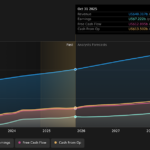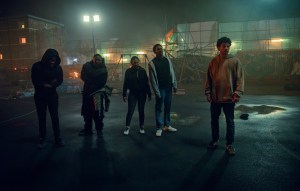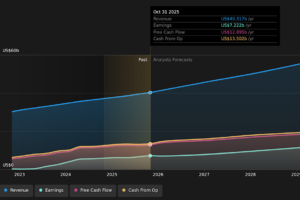At the moment, Rapman’s superpower is patience. It’s late May and the filmmaker is eagerly awaiting Thursday’s release of “Supacell,” his new superhero series for Netflix that is set in South London and features an all-Black cast.
“I’m kind of counting down the days like a kid at Christmas right now,” says Rapman, nee Andrew Onwubolu, from his home in London.
“Supacell,” which was created, written, produced and codirected by Onwubolu, is the follow-up to his buzzy feature-length directorial debut “Blue Story.” The film was released in the U.K. in late 2019 with a U.S. theatrical release to follow in 2020, shortly after the film’s lead Micheal Ward won the BAFTA EE Rising Star award. The pandemic altered the film’s runway, but didn’t curtail Onwubolu’s ascent.
Onwubolu turned his focus to writing “Supacell,” based on a simple premise: “I wanted to make something about normal people with powers,” he says. The series was greenlit by Netflix in 2021, and began production in 2022.
You May Also Like
“If you want eyes on your project, there’s no platform better than Netflix,” says Onwubolu, adding that he took his first meeting with the head of Netflix U.K. in 2018, before the release of “Blue Story.” “At that point, my movie wasn’t even out. I just had a lot of stuff on YouTube that was building up really big buzz,” he says. “So the movie came out, did well. I remember getting an email from Netflix in the lockdown: ‘That show you were talking about — do you want to start working on it?’”

Onwubolu, a longtime fan of comic books, grew up collecting X-Men cards and watching “Batman” before Marvel and DC became cinematic juggernauts. Now 35, he is also fond of the mid-2000s TV series “Heroes,” in which everyday people discover they possess superpowers. The main cast was predominantly white. “I always thought, yeah, these shows are really good, but I don’t really see it being realistic to my world,” Onwubolu says. “Like, I don’t think if I had powers I would be a part of the ‘Heroes’ gang, you know what I’m saying?”
He set out to ground his series in real life: What would happen if he suddenly discovered that he had supernatural powers?
“I’m not trying to get spandex and a mask and trying to stop a bridge from falling. That’s not the first thing,” he says, adding that realistically, first and foremost, his focus would be on ensuring his family’s well-being. “And when I’m comfortable, now what can I do to help others?”
The series follows five main character story lines, but is anchored by its lead Tosin Cole, who Onwubolu met through mutual friend Damson Idris. Cole stars as Michael, a South London parcel delivery driver who at the start of the series is on the cusp of proposing to his longtime girlfriend. He discovers that he possesses a superpower, and is tasked with finding others like him in order to prevent a personal tragedy. “None of them are heroes, none of them are villains. And I just wanted to show that reflected: humanity with superpowers,” Onwubolu says.

Onwubolu paved his own way into the entertainment industry, bolstered by early success on YouTube. Originally focused on music, he began making videos to accompany his songs, building up a fan base that was mainly local to his own neighborhood in London at first.
“I always loved stories and obviously I loved music as well. When I would listen to albums, I would love the songs that were storytelling songs like Jay-Z’s ‘A Week ago’ or Biggie Smalls’ ‘Gimme the Loot,’” he says, adding that those songs were never made into music videos. “When I started rapping and doing music, I started doing these storytelling songs and I was like, I’m going to do videos for them, though. I’m going to make them look like short films.”
After releasing his first short musical film, “Blue Story,” commenters suggested turning it into a feature. Onwubolu reached out to writers, realized he wouldn’t be able to afford hiring anyone, and decided he would write it himself. He went on to release the three-part short film “Shiro’s Story,” narrated through rap. It went viral and networks began reaching out — it also led to him getting signed to Jay-Z’s Roc Nation label.
“Everyone’s like, look, we love ‘Shiro’s Story,’ but have you got anything else?” Onwubolu says. “I said, ‘Yo, I’ve got this script I wrote some years ago, but I think this could be a good film.’ So they got the script, it got made, Hollywood started reaching out, and they’re like, ‘Hey, you want to do this movie with Russell Crowe?’”
Around the same time he began writing “Supacell,” Onwubolu was working on a remake of the French film “A Prophet” helmed by Russell Crowe. The studio behind the project pulled the plug one year into development, and looking back, Onwubolu sees that things worked out as they were supposed to.
“I thought it was a bit early for me to start doing remakes,” he says. “I’ve got a unique voice, and I think unique voices should put their voices out first — I would have put my touch on [“A Prophet”], but I think deep down it wasn’t meant to be my path to go do a remake on my second project.”
Onwubolu hopes that “Supacell” will become a gateway for other Black-led sci-fi and fantasy series to get greenlit. “This show’s bigger than just the U.K.,” he says. “It’s actually a door opener where we could get a ‘Harry Potter’ version of a type of story with a predominantly Black cast — or ‘Lord of the Rings’ or ‘Game of Thrones,’” he says. “This could be the start of that movement. If it does well, Apple might want to show like that. If it does well, Amazon might want to show like that.”
And that might just ultimately become the superpower of “Supacell.”
“So, there’s a lot riding on it.”











